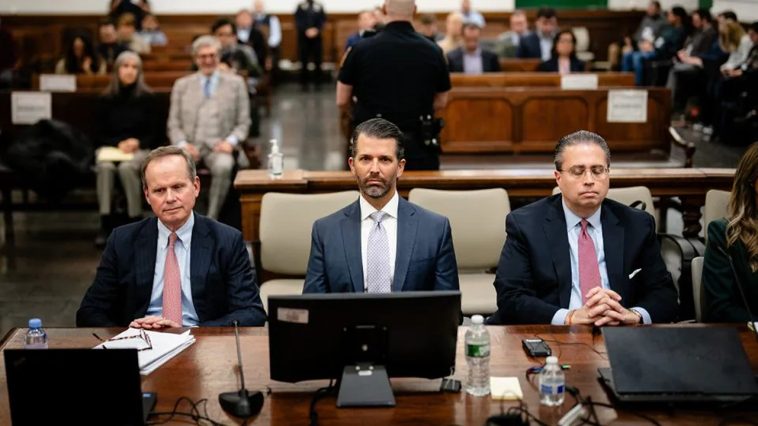LISTEN HERE:
On Monday, Donald Trump Jr., the eldest son of former President Donald Trump, made his appearance again in the on-going civil fraud trial in New York–a trial that could considerably impact his father’s vast real estate holdings.
Trump Jr., who serves as an executive vice president for Trump Organization, earlier gave his testimony on the first and second days of November. His major argument was that he was not directly involved in the preparation of the company’s yearly financial records, which are currently under scrutiny.
Noteworthy is his assertion that he had placed confidence in the company’s long-serving CFO and external accounting experts to assure the accuracy of these financial statements. Their meticulous efforts in maintaining financial integrity, he emphasized, were critical in ensuring the legitimacy of the organization’s financial operations.
Conversely, Letitia James, the Attorney General of New York, has accused Donald Trump, his company, and its high-level executives, including Trump Jr., of exaggerating their financial worth by several billion dollars. According to her, they provided these falsely-inflated financial declarations to banks, insurers, and other entities for loan procurement and deal negotiations.
James is presently seeking restitution of more than $300 million, arguing that these funds were procured by deceitful means. She also advocates for a New York business prohibition to be imposed on the defendants. Essentially, the lawsuit is not just challenging the financial practices of Donald Trump and his executives, but the very essence of their business operations.
Examining the case prior to the trial, Judge Arthur Engoron said that the defendants had committed fraud by overstating their assets’ value and overall net worth in financial disclosures. As a result, he imposed punitive action, which could potentially force Trump to surrender high-profile properties such as the iconic Trump Tower. Despite this, an appellate court has currently allowed Trump to retain control over his properties.
Throughout the process, the Trumps have vehemently denied any malpractice, with their defense arguing strenuously that the State has been unable to meet the requisite ‘legal standard’ to back up the allegations of conspiracy, insurance fraud, and business record falsification.
After six weeks of exhaustive examination and the testimony of over two dozen witnesses including company insiders, accountants, bank officials, and Michael Cohen–once Trump’s trusted confidant turned critic–the state rested its case last Wednesday.
The trial resumed as scheduled despite an appeal from the defense team last week for an early termination via a directed verdict. While Engoron didn’t expressly provide a ruling on the request, he hinted that the trial would progress as planned.
Christopher Kise, one of the attorneys for Trump, while making a case for acquittal for Trump and the other defendants last Thursday, claimed that it was erroneous to treat successful and profitable loan transactions as fraudulent. He emphatically pointed out that ‘there are no victims, no complainant, and no injury’ in the case.
Trump Jr., who earlier testified in November, aligned his narrative with his father’s, characterizing the ongoing lawsuit as a political witch-hunt. He sees it as a strategy by James, a Democrat, to undermine Donald Trump’s prospects as the leading candidate for the 2024 Republican presidential nomination.
He is expected to testify again on Monday and Tuesday, and following his testimonies, a tax lawyer who previously served as a state witness will also provide his deposition. It shows an intense legal battle with no party ready to back down.
Trump Jr.’s defense is planning to summon a bunch of expert witnesses hoping to discredit the testimonies given by the state’s witnesses. They aim to counter the state’s claims that Trump Jr.’s inflated financial statements allowed him to secure more favorable loan terms and insurance premiums and gave him an upper hand in business negotiations.
In his earlier deposition, when quizzed about whether he had ever worked on his father’s ‘statement of financial condition,’ Trump Jr. responded with, ‘Not that I recall.’ He stated he approved the statements in his capacity as a trustee but delegated the day-to-day handling of these documents to external accountants and the company’s CFO at that time, Allen Weisselberg.
Trump Jr. emphasized that his role was to ‘listen’ to those who possessed intricate knowledge of financial matters. His decision making was driven by the information presented to him by these experienced professionals whose expertise in accounting assessment, he argued, was unparalleled.
He stated, ‘I had an obligation to listen to the people with intimate knowledge of those things.’ He affirmed his trust in these professionals’ abilities to deliver precise information based on their deep understanding of the company’s financial affairs.
As the trial unfolds, all eyes will be on Trump Jr., on his testimony, his legal team’s defense strategies, and on whether the trial can ascertain whether Trump’s financial statements were indeed manipulated to his advantage.



